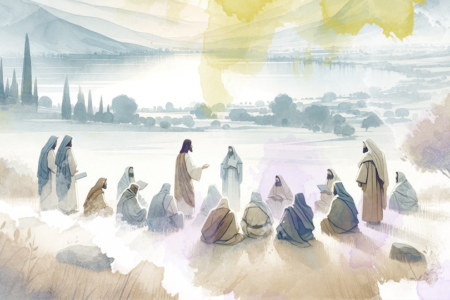A HAND FOR THE TORCH: The Conversion of Saul of Tarsus
God’s man was on the ground. The bolt of light that put him there made the high noon of a brilliant Syrian sky look like midnight by comparison. The companions of the man from Tarsus were stunned and uncomprehending. Unknown to them, they were witnessing a birth – one which had been a long time coming. For Saul, the reluctant Pharisee, had been moving toward this appointment with a sovereign God from his entrance into the world at Tarsus of Cilicia. By his own account, he was “. . . set apart, even from his mother’s womb” (Galatians 1:15). Just how Jehovah brought about this setting apart is as instructive as it is thoroughly intriguing, and projects a flowing testimonial to the faithfulness of a covenant-keeping God; a God who had promised to set a light among the Gentiles.
A Prepared World
Saul first saw the light of day in a world which was rapidly approaching the threshold of its greatest pivotal epoch. Over the millennia preceding his birth, a meticulous process of preparation had been activated. Empires, cultural forces and the Chosen People, Israel, moved in concert toward the most climactic revelation in human history. Events were unfolding which would see the pendulum of prophetic promise sweep down to touch a manger in Bethlehem, then begin an upward arc that would swing past a cross and beyond an empty tomb. It would continue to rise with His ascension, move on toward a second advent, Kingdom Age and disappear in the eternal regions of a New Heaven and a New Earth wherein dwelleth righteousness. The momentum of that upward movement would carry millions of believers, Jew and Gentile, into the favor and presence of the eternal God, who had set the works of His redemptive timepiece in motion.
Imperial Rome had brought stability and the vaunted Pax Romana, peace of Rome, to the known world. People could now move over an extensive system of roads to the distant reaches of the empire in relative security. To compliment this, the Greeks provided a culture which had captured the subjects of Rome as surely as the legions had confiscated their territories. Hellenism’s central beneficial legacy was the Greek language which provided a communications vehicle for the people in the provinces. Both of these elements, however, were only incidental and supportive factors to what was being transacted in the tiny province of Judea, where biblical Judaism was witnessing the fulfillment of her long cherished hope: Jesus Christ was born in Bethlehem and began His sojourn on earth as the God-Man.
A Prepared Man
As surely as God had prepared a world for the advent of His own entrance into time, He was preparing a man to carry the Gospel torch and bring the light of Christ to the Gentiles. For only a few years after Christ was born, Saul of Tarsus put in his appearance in a commercial- intellectual city well to the north of Palestine.
A Hebrew of Hebrews
Saul, later to become Paul, was, in his words, “. . . of the nation of Israel, of the tribe of Benjamin, a Hebrew of Hebrews; as to the Law, a Pharisee” (Philippians 3:5). He was parented by devout adherents to Judaism; people who were, no doubt, of some prominence and perhaps wealthy. Saul’s education was undertaken in Jerusalem in the school of Gamaliel, a grandson of the revered Rabbi Hillel. Gamaliel’s brand of Phariseeism was not couched in the unthinking superficial hypocrisies so characteristic of the times. He was a sincere seeker after “the glory of the law”. Thus, his protege came away a sincere Jew, wholly given to the nobler traditions of Judaism. He was one who could say with all sincerity, “. . . touching the righteousness which is of the law, blameless” (Philippians 3:6). His unrelenting persecution of the Church was done in ignorance, believing as he did that Jesus was another usurping false Messiah whose work and influence must be undone for the sake of right and truth.
Above all else, the “Hebrew of Hebrews” early preparation left him with a knowledge of the Word of God. He had an intimate education in the Hebrew Scriptures that would later serve as the foundation on which the Holy Spirit would construct the greatest theological structure ever seen by humanity. When he awakened to the truth in Christ, the types and symbols of the Scriptures came alive. Philip Schaff, the noted church historian, writes:
In Abraham he saw the father of the faithful, in Habakkuk a preacher of justification by faith, in the paschal lamb a type of Christ slain for the sins of the world, in the passage of Israel through the Red Sea a prefigurement of Christian baptism, and in the manna of the wilderness a type of the bread of life in the Lord’s Supper.
Civis Romanus
Saul was in the enviable position of one who had inherited Roman citizenship. He was Civis Romanus Sum, a full citizen of Rome. When he was about to be examined by scourging at Jerusalem, he asked the centurion, who was overseeing the punishment, “Is it lawful for you to scourge a man who is a Roman and uncondemned” (Acts 22:25)? A perplexed commander, hurriedly brought to the scene, asked Paul if he were in truth a Roman citizen. He replied, “Yes.” The commander exclaimed, “I acquired this citizenship with a large sum of money.” Paul said, “But I was actually born a citizen” (Acts 22:28).
Roman citizenship was a cherished privilege for the people of his day. It insured application of Roman security on behalf of sons of the state. Protection by Rome and the guarantee of due process before her courts were inherent in citizenship. One could move about the empire in full command of all of the rights and privileges the master of the world offered.
Grecian Culture
As was true with Alexandria in Egypt, Tarsus stood at the confluence of East and West. Roman order, Greek wisdom and Oriental mysticism were deeply woven into the fabric of community life. Geographically, it was located in Asia Minor, about ten miles inland from the northern shore of the Mediterranean Sea. Culturally, it was Greek. For over a century before Saul was born, the thought life of the city had been colored by a school of philosophy which was resident there. In this atmosphere Saul soon became well acquainted with the Hellenistic culture. As a result, he knew the language and became conversant in the poetry, philosophy and history of the Greeks. So much so that on later occasions he would quote from their poets, Menander and Epimenides. Following his conversion, his knowledge of the Grecian games would provide magnificent metaphorical settings for his illustrations of the Christian’s warfare. A classic example of Paul’s command of this knowledge came in his address to the Epicurean and Stoic philosophers in Athens (Acts 17:16-34). He exposed the emptiness of their mythological speculations, declared the necessity of seeking the one true God, quoted from their poets, then moved to a dissertation on repentance, righteousness and resurrection.
Thus we are confronted by an amazing exhibition of divine synchronization. Rome had given the world a secular peace and well-maintained system of highways. Through the Greeks a universal language had come into being. In Jewry, God had preserved true religion in an era of rampaging paganism.
In Saul of Tarsus, God was tempering an instrument in which all of these essential elements were fused. He was a “Hebrew of Hebrews” with a knowledge of the Word of the Lord pulsating through his being. As a full citizen of Rome Saul enjoyed the benefits which would allow him to move unhindered across the face of the empire. Hellenism had brought him the language of the people and an understanding of the woes, wants and ways of the Gentiles. He was a magnificent specimen – one fully prepared to move to the task, once the divine light of the truth in Christ had broken over him. In Saul of Tarsus God had fashioned a man for the Court, the Council and the Congregation. He would stand with boldness, grace and dignity before the representatives of the empire. His influence for the Messiah would ultimately invade the courts of the imperial palace of the Caesar. Rome’s noblest citizen could affirm that “My bonds in Christ are manifest in all of the palace (praetorium)” (Plillippians 1:13), and send greetings from the saints, “. . . especially those of Caesar’s household” (Philippians 4:22).
Paul would face the Council of the elders of his people clothed in the power of the God of Israel to declare the fulfillment of all Jehovah had promised in the Messiah, Jesus. Jewish synagogues throughout the empire would ring with the clear witness of the Pharisee-turned-Apostle’s unanswerable message.
In the congregations scattered through the provinces, he would minister to a polyglot of humanity; “Greek and Jew, circumcised and uncircumcised, barbarian, Sythian, slave and freeman . . .” (Colossians 3:11). Paul understood them, ministered to their needs, and forged the Spirit-breathed documents that would embody chart and compass for the Church of Jesus Christ.
A Prepared Place
As Saul and his companions made their way toward Damascus, there was a convergence of quite another kind – one which was not confined to religion, nationality nor culture. Something had been taking place in Saul that served to intensify the flood of vehemence which drove him to attempt to destroy the infant church.
First there was the surge of conscience aroused by the very people he had set about to destroy. He articulates this fact in his address before Felix. “And as I punished them often in all the synagogues, I tried to force them to blaspheme; and being furiously enraged at them, I kept pursuing them even to foreign cities” (Acts 26:11). This statement reveals a man fast in the grip of a dual frustration: an inability to dissuade them from their faith in Jesus; and the disquieting awareness of the fact that they possessed a spiritual serenity which, in spite of his dogged pursuit of the law, he had never found himself. Jesus would remind him that it was difficult “to kick against the goads” (Acts 26:14b). Those “goads”, emanating from the unswerving loyalty of the followers of the Messiah, drove him relentlessly toward the point of confrontation with Jesus Christ. He would say later of his Jewish brethren that he longed to “provoke them to jealousy . . .” (Romans 11:14). Paul had himself experienced the intensity of a jealousy fired by the assurance displayed in men and women who had found peace through Jesus of Nazareth.
Then there was Stephen. He, too, had exhibited the enigmatic peace, and a pure love for his interrogators and executioners. So as Saul flung his stones at the battered martyr-saint, his soul must have been buffeted by the irresistible force of the Word of God which Stephen had laid before the Sanhedrin. The man had begun with Abraham and slowly wove his way through the histories of Joseph, Moses, David and the prophets. Along the way he had emphasized Israel’s consistent disobedience to God. He spoke of the messianic promises and how their leadership had slain those who had “Announced the coming of the Righteous One” (Acts 7:52). The crowning accusation came with the words, “You who received the law as ordained of angels, and yet did not keep it” (Acts 7:53). There was no way to avoid the devastating denunciation – it was Bible; it was history; it was true. Saul was enraged. He would not allow himself to let the truth linger in his mind. He would, he thought, wash it away with the blood of new martyrs. Stephen died with his eyes firmly fixed on the “. . . glory of God, and Jesus standing at the right hand of God” (Acts 7:55).
Arrestingly, God took up with Saul where He left the record of Stephen: with the glory of God, and Jesus standing above him! This man who was so perfectly endowed with the attributes and attainments to be the man God could use to shake a world, had reached the appointed place – he was brought down by Jesus Christ. A light and the Lord flung him prostrate to the ground, and a broken sinner was reconciled to God. Saul’s recognition of Jesus as his Savior-Messiah was followed by a declaration of divine intent for His stalwart torchbearer:
But arise on your feet; for this purpose I have appeared to you, to appoint you a minister and a witness . . . to open their eyes so that they may turn from darkness to light and from the dominion of Satan to God, in order that they may receive forgiveness of sins and an inheritance among those who are sanctified by faith in me (Acts 26:16, 18).
Slowly, ever so slowly, God’s man rose to his feet – the world has never been the same.






